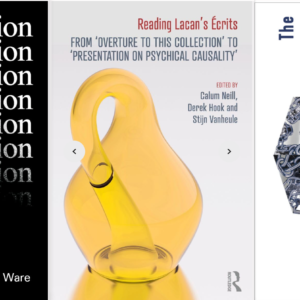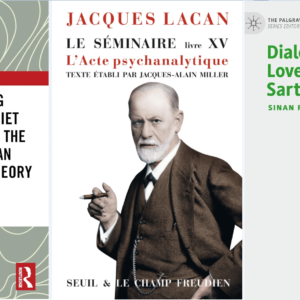News – July 2013
As previewed on this site a few months ago, PIPOL 6, the European Congress of Psychoanalysis, was held in Brussels on 6th and 7th July. The theme was ‘After Oedipus – Diversity of the psychoanalytic practice in Europe’. For those that weren’t able to attend, shortly after the Congress finished Jean-Daniel Matet wrote up this helpful summary of the discussions. The presentations at the Congress were fast and concise, lasting only 15 mins each and translated simultaneously into English, Dutch, Italian, Spanish and Portuguese. Mercifully for anyone who has attended psychoanalytic talks and noted this problem, long, meandering questions were banned. A communiqué sent ahead of the Congress warned “a question that drags on for five minutes is no question, it is an answer”.
The title of the 2014 Congress of the AMP (World Association of Psychoanalysis) was suggested by Jacques-Alain Miller, in his closing presentation at the last Congress in 2012, as ‘A Great disorder of the Real in the 21st Century’.
Working towards the Congress, many Lacanians have already begun preparing work on this theme. More on the theme of the Congress – now titled ‘A Real for the XXIst Century’ – on the Congress’s site here. If you want to attend and keep up to date with all of the discussion in the months running up to it, the NLS (New Lacaniann School) is sending out regular updates via its ‘What’s up!’ newsletter, all previous editions of which can be found here.
One of the more interesting contributions on the theme of the 2014 Congress came to light in July from Argentine analyst Leonardo Gorostiza. An amphibology is an ambiguity of expression. That definition might help when reading his ‘Amphibologies of the Real’, a title which he borrows from a term coined by Jacques Alain-Miller (again), who first used it in his L’orientation lacanienne course in 2010-2011. The article nicely summarises the different meanings, or ‘variations’, that Lacan applied to the term over the course of his teaching, looks at what the category of the real means for us today, and how this register manifests itself.
Similarly, the Irish Circle of the Lacanian Orientation (part of the NLS) is working on this theme with a talk scheduled for 28th September with Patrick Monribot in Dublin on the clinical consequences of Lacan’s adage ‘il n’y a pas de rapport sexuel’ (‘there is no sexual rapport’). Here’s the flyer for the talk and keep an eye on the group’s site for more information.
If you are interested in joining the work towards the Congress, you may want to get involved in one of the electronic cartels for 2013-2014. For those not familiar with the term, cartels are small study groups focused on a particular topic with the aim of producing a piece of work that is the result of their collective efforts. These electronic cartels are focused on the work around the theme of the next AMP Congress. You can find some reports on the previous round of electronic cartels ahead of the last AMP Congress on the theme of the symbolic in the XXIst century here.
One of the problems with the news summaries on this site is the lack of news from the southern hemisphere. This is largely due to a language barrier between the English/French-dominated northern hemisphere and the Latin American countries that speak Spanish/Portugese. Fittingly therefore, an event aimed at uniting the two is targeted to a north American audience and entitled ‘To speak with the body – the crisis of cultural norms and the agitation of the real’. As you can see, this is also focused on the theme of the next AMP Congress. To be held in Buenos Aires in late November, ENAPOL VI (American Encounter of Psychoanalysis of the Lacanian Orientation) aims to bridge the north-south gap. Read more about the event and register your interest here,or visit its site.
As heralded back in April, The EuroFederation of Psychoanalysis, a European network of analysts concerned with the political status of psychoanalysis, has now published its updated Directory of Adherents. It is not a list of practicing Lacanian analysts, but instead a directory of those who “support Lacanian psychoanalysis as it is practised and taught in the Freudian field.” It is worth checking out if you’re based in Europe (or even further afield) and are looking to get in touch with Lacanians in Europe.
The London-based reading group studying Seminar VII: The Ethics of Psychoanalysis will reconvene after the summer on Saturday 7th September in its new location of Room GOR 323, Birkbeck College, 43 Gordon Square, London. The group will be resuming from the session of 3rd February 1960, at p.128 of English translation. A £15 contribution is asked for (£10 concession). Keep an eye on LacanianWorks for more updates and a superb collection of resources to help with the reading.
The new DSM-V has come under such sustained attack from multiple quarters since its publication in May that it seems almost too obvious to continue linking to articles against it, now that the initial furore has somewhat subsided. However, in July there were a couple of pieces penned by esteemed commentators that make it worth including here as ‘last words’ on the matter. Firstly, Ian Hacking, a brilliant writer on the history and philosophy of science with many fascinating things to say on the subject of psychoanalysis, has contributed a review of the DSM-V for the London Review of Books. It will be published in the 8th August edition but you can read it now online here. And secondly, journalist and author Will Self has written this piece for The Guardian on the current lamentable imbroglio that psychiatry finds itself in under the direction of the DSM.
Lacanian opposition to cognitive behavioural therapy is also well-documented, with anthologies such as this having been available for years elegantly chronicling its short-comings. However, Lacanians may also be interested in a more recent meta-analysis of CBT published in the Canadian Journal of Psychiatry in July which concluded that it does not out-perform any other therapies the studies looked at. You can read the abstract of the report, stating its main conclusion – “We did not find any indication that CBT was more or less effective than other psychotherapies or pharmacotherapy” – here.
Finally, some light reading that appeared in the hidden recesses of the web in July. Lacan scholar Adrian Johnston’s 2009 article ‘Affects are Signifiers: The Infinite Judgement of a Lacanian Affective Neuroscience’ is a carefully argued piece and beautifully written. Uber-psychoanalysis geeks may want to check it out here.
Got news? Get in touch.




Leave a Reply